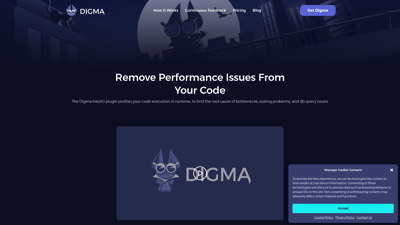Digma Continuous Feedback is an innovative tool designed to enhance the software development lifecycle by providing real-time insights into code performance. By integrating seamlessly with your development environment, Digma helps developers identify and resolve performance issues proactively, rather than reactively. This not only improves code quality but also accelerates the development process, allowing teams to release updates faster and with greater confidence. With features like automatic bottleneck identification and continuous profiling, Digma is the go-to solution for developers looking to optimize their applications and enhance their overall productivity.
Digma
Features of Digma Continuous Feedback
1. Continuous Profiling
Digma continuously profiles your application across development, testing, and production environments. This means that performance issues are identified in real-time, allowing developers to address them before they impact users.
2. Integration with Development Environments
Digma integrates directly with popular IDEs, enabling developers to see performance issues highlighted in their code without switching between multiple tools. This seamless integration enhances workflow efficiency.
3. Automated Issue Identification
With Digma, developers no longer need to manually track down performance bottlenecks. The tool automatically identifies and prioritizes critical issues, providing detailed insights into where problems lie within the code.
4. Enhanced Collaboration
Digma facilitates better collaboration among teams by providing pull request feedback and code review annotations. This ensures that performance considerations are integrated into the development process from the start.
5. Local and Centralized Deployment Options
Digma is free to use in local environments, making it accessible for individual developers. For teams looking to connect to CI or production environments, Digma offers scalable options that cater to larger teams and projects.
6. Real-time Feedback
The platform provides real-time feedback during the development cycle, allowing developers to make informed decisions based on actual performance data rather than assumptions.
7. Community Support
Digma boasts a vibrant community of developers who share insights, tips, and best practices. This collaborative environment helps users maximize the tool's potential and stay updated on the latest trends in performance optimization.
Digma Continuous Feedback - Frequently Asked Questions
What makes Digma different from traditional observability tools?
Digma stands out because it generates actionable feedback directly within the developer's workflow, turning raw data into usable insights. Unlike traditional tools that react to problems, Digma takes a proactive approach to performance optimization.
Is Digma free to use?
Yes, Digma is free for local deployments. However, connecting to a centralized environment may incur costs, depending on the team's needs.
Do I need to modify my code to use Digma?
No, Digma can be set up without any code changes. It integrates smoothly into your existing development environment.
Can Digma predict future code behavior?
Digma does not predict behavior; instead, it provides insights based on real production data, helping developers understand current performance issues.
How does Digma handle observability data?
Digma runs all analytics locally, ensuring that no observability data is sent to the cloud, thus maintaining data privacy and security.
